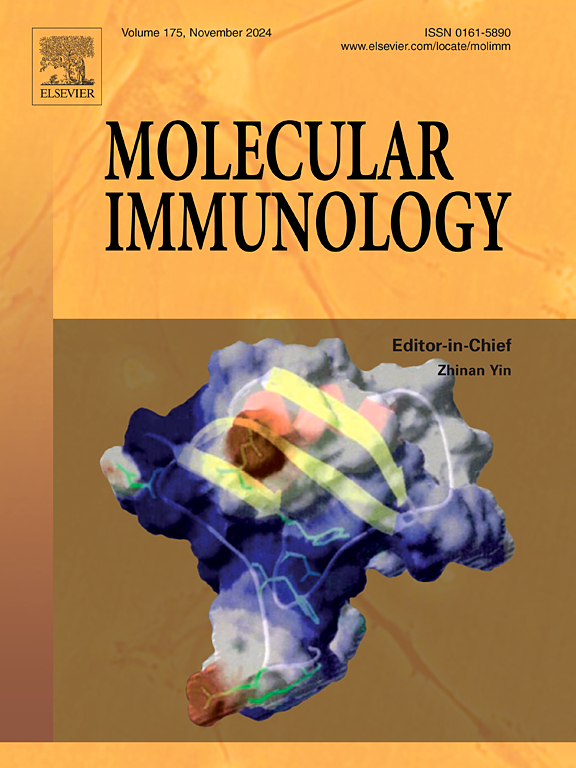A retrospective study on the correlation between antibody levels and endothelial function in SLE patients: An analysis based on ultrasound and serum biomarkers
IF 3.2
3区 医学
Q2 BIOCHEMISTRY & MOLECULAR BIOLOGY
引用次数: 0
Abstract
Background
Systemic lupus erythematosus (SLE) was a complex autoimmune disease characterized by a spectrum of clinical and immunological manifestations, with cardiovascular disease (CVD) being a leading cause of morbidity and mortality. Endothelial dysfunction was critical in the pathogenesis of atherosclerosis and other cardiovascular complications in SLE. This study aimed to investigate the correlation between autoantibody levels and endothelial function in SLE patients using ultrasound and serum biomarkers.
Methods
A retrospective case-control study was conducted with 317 SLE patients treated from December 2021 to December 2023. Patients were categorized based on Flow-Mediated Dilation (FMD) values into an abnormal endothelial function group (n = 191) and a normal function group (n = 126). Serum biomarkers, including soluble thrombomodulin (sTM), von Willebrand factor (vWF), and soluble vascular cell adhesion molecule-1 (sVCAM-1), were assessed. Autoantibody levels were measured using enzyme-linked immunosorbent assays for anti-double stranded DNA (anti-dsDNA), anti-Smith, and anticardiolipin antibodies levels. Statistical analyses, including correlation and logistic regression, were performed to determine associations between antibody levels and endothelial function.
Results
Higher levels of Anti-Smith were significantly associated with poorer endothelial function, while higher Anti-dsDNA levels were positive correlated with endothelial function (Anti-Smith: coefficient = −0.168, Std_Error = 0.027, t_value = −6.228, P < 0.001; Anti-dsDNA: coefficient = 0.140, Std_Error = 0.022, t_value = 6.345, P < 0.001). These results underscore the importance of antibody levels in assessing endothelial health.
Conclusion
This study highlights the intricate relationship between specific autoantibodies and endothelial dysfunction in SLE patients. Elevated sVCAM-1 and Anti-Smith levels were associated with a higher risk of endothelial impairment, whereas Anti-dsDNA antibodies showed a positively correlated better endothelial function.
SLE患者抗体水平与内皮功能相关性的回顾性研究:基于超声和血清生物标志物的分析
系统性红斑狼疮(SLE)是一种复杂的自身免疫性疾病,以一系列临床和免疫学表现为特征,心血管疾病(CVD)是发病率和死亡率的主要原因。内皮功能障碍在SLE的动脉粥样硬化和其他心血管并发症的发病机制中至关重要。本研究旨在通过超声和血清生物标志物研究SLE患者自身抗体水平与内皮功能的相关性。方法对2021年12月至2023年12月期间接受治疗的317例SLE患者进行回顾性病例对照研究。根据血流介导的舒张(FMD)值将患者分为内皮功能异常组(n = 191)和功能正常组(n = 126)。评估血清生物标志物,包括可溶性血栓调节素(sTM)、血管性血液病因子(vWF)和可溶性血管细胞粘附分子-1 (sVCAM-1)。采用酶联免疫吸附法测定抗双链DNA(抗dsdna)、抗smith抗体和抗心磷脂抗体水平,检测自身抗体水平。统计分析,包括相关性和逻辑回归,确定抗体水平和内皮功能之间的关系。结果Anti-Smith水平越高,内皮功能越差,Anti-dsDNA水平越高,内皮功能越差(Anti-Smith系数= - 0.168,Std_Error = 0.027, t_value = - 6.228, P <; 0.001;Anti-dsDNA:系数= 0.140,Std_Error = 0.022, t_value = 6.345, P <; 0.001)。这些结果强调了抗体水平在评估内皮健康中的重要性。结论本研究强调了SLE患者特异性自身抗体与内皮功能障碍之间的复杂关系。升高的sVCAM-1和Anti-Smith水平与内皮损伤的高风险相关,而抗dsdna抗体则与更好的内皮功能呈正相关。
本文章由计算机程序翻译,如有差异,请以英文原文为准。
求助全文
约1分钟内获得全文
求助全文
来源期刊

Molecular immunology
医学-免疫学
CiteScore
6.90
自引率
2.80%
发文量
324
审稿时长
50 days
期刊介绍:
Molecular Immunology publishes original articles, reviews and commentaries on all areas of immunology, with a particular focus on description of cellular, biochemical or genetic mechanisms underlying immunological phenomena. Studies on all model organisms, from invertebrates to humans, are suitable. Examples include, but are not restricted to:
Infection, autoimmunity, transplantation, immunodeficiencies, inflammation and tumor immunology
Mechanisms of induction, regulation and termination of innate and adaptive immunity
Intercellular communication, cooperation and regulation
Intracellular mechanisms of immunity (endocytosis, protein trafficking, pathogen recognition, antigen presentation, etc)
Mechanisms of action of the cells and molecules of the immune system
Structural analysis
Development of the immune system
Comparative immunology and evolution of the immune system
"Omics" studies and bioinformatics
Vaccines, biotechnology and therapeutic manipulation of the immune system (therapeutic antibodies, cytokines, cellular therapies, etc)
Technical developments.
 求助内容:
求助内容: 应助结果提醒方式:
应助结果提醒方式:


